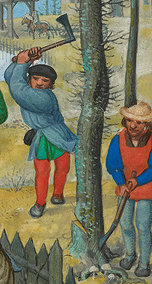EARNING A LIVING

The owners of the parcels at what later became the Lauby site had the right to make and sell alcohol, to practice a trade (if they had completed their training in it), to engage in trade, or to supplement their livelihood by cultivating the land or keeping farm animals. Particularly important for Ostrava’s burghers were the rights to brew and sell beer, to serve wine, and to distill and sell spirits. This set of rights provided a reliable income for the house-owners until it was abolished in 1870.
CRAFTS AND TRADES
A fundamental feature of a functioning urban organism is a specialized and diverse range of craft production. However, archeologists have found no traces of a craft workshop at the Lauby site, so the existence and crafts and trades can only be deduced from the items that were unearthed there. Spindles found on three parcels (nos. 54, 56 and 59) indicate that people made cloth at home. Offcuts of leather from parcel no. 54 suggest the presence of a shoemaker or somebody making other leather items. An axe indicates woodworking, and a hammer indicates metalwork. Numerous general-purpose implements (such as knives) were also found at the Lauby site.
← Back Next →
Akce: Otevřít verzi pro tisk
